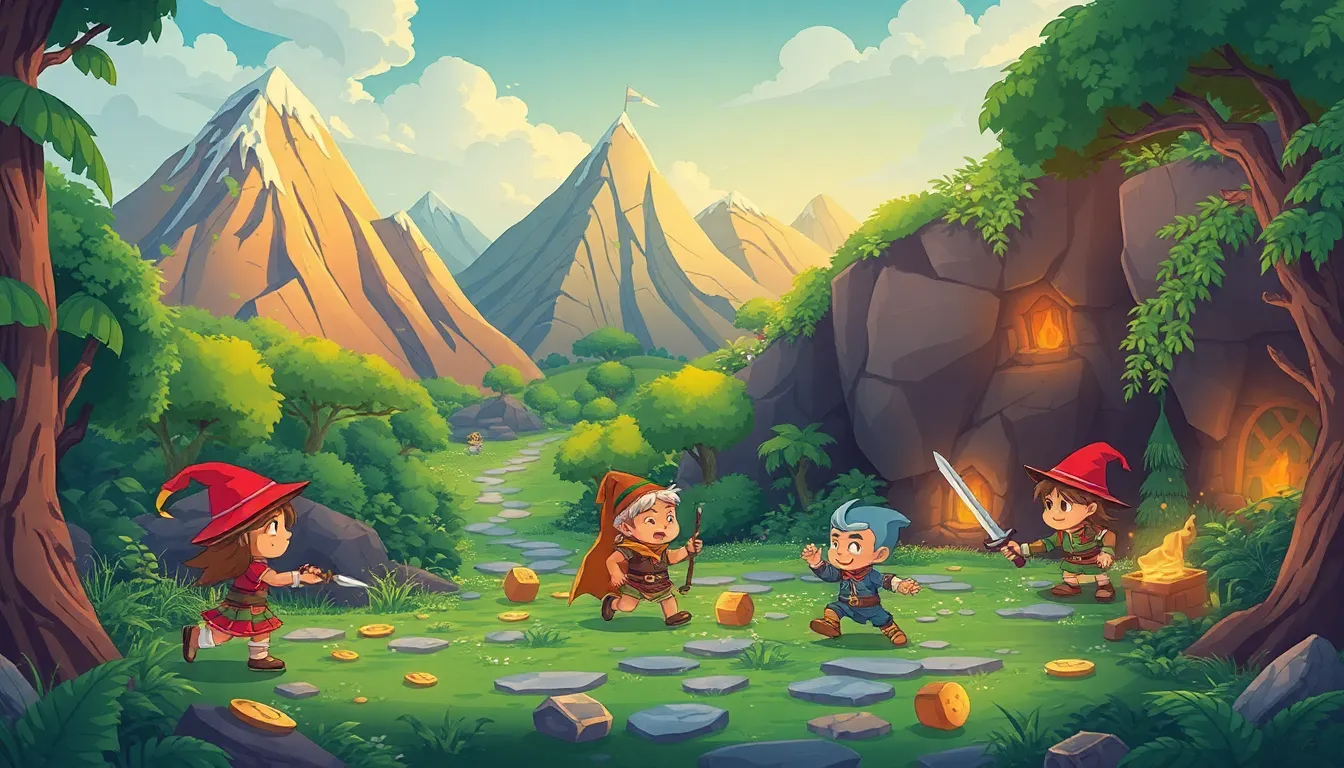RPG gaming isn’t just a pastime; it’s an epic adventure waiting to unfold. Picture this: you’re not just sitting on your couch; you’re wielding a sword, casting spells, and saving kingdoms—all from the comfort of your living room. Whether you’re a seasoned hero or a curious newbie, the world of role-playing games offers a chance to dive into rich narratives and unforgettable characters that make reality feel a little less… well, real.
Table of Contents
ToggleOverview of RPG Gaming
RPG gaming offers an immersive journey that captivates players. This genre combines narrative depth with character development, resulting in unique adventures.
Definition of RPG Gaming
RPG gaming, or role-playing games, involves players assuming the roles of characters in a fictional setting. Players engage through storytelling, often participating in quests and challenges. They customize character traits, which influence gameplay, and make decisions that shape the narrative. These games can be tabletop or digital, with popular titles like Dungeons & Dragons and The Witcher. Each game type presents distinct mechanics, yet the core remains the same: players create their own stories.
Historical Background
RPG gaming traces its origins to tabletop games in the 1970s. Dungeons & Dragons, released in 1974, marked a significant turning point, introducing structured gameplay. This game inspired countless imitators, expanding the genre’s reach. By the 1980s, video game adaptations began emerging, transitioning the experience to digital platforms. Titles such as Final Fantasy and Dragon Quest proved immensely popular in Japan and the West. Over the years, RPG gaming evolved further, incorporating diverse flavors like action RPGs and massively multiplayer online RPGs, appealing to a wider audience.
Types of RPGs

RPGs come in various forms, each offering unique experiences for players. Understanding these types helps in choosing the right gaming style.
Tabletop RPGs
Tabletop RPGs foster creative storytelling and collaboration. Players gather around a table, usually with a game master who directs the narrative. Dungeons & Dragons stands out, often credited as a pioneer in the genre. Players build characters with specific traits and engage in adventures driven by dice rolls and dialogue. Experience shares a strong connection among participants, enhancing engagement through imaginative interactions.
Video Game RPGs
Video game RPGs immerse players in interactive digital worlds. Titles like The Witcher and Final Fantasy exemplify this evolution from tabletop roots. Players design characters and make decisions that affect gameplay outcomes. Graphics and sound amplify the storytelling experience, providing rich environments to explore. These games often offer quests, combat systems, and character progression, appealing to a broad audience.
Live Action Role-Playing (LARP)
Live Action Role-Playing, or LARP, brings RPGs to life through physical activity. Participants dress as their characters and enact scenarios in real-world settings. This form emphasizes creativity, improvisation, and social interaction, allowing players to embody their roles fully. Events can range from small gatherings to large, organized festivals, attracting diverse communities. Engaging in LARP often results in memorable adventures and a deep sense of camaraderie among players.
Key Elements of RPG Gaming
RPG gaming encompasses several key elements that define the player’s experience. These components create depth and engagement.
Character Development
Character development serves as a cornerstone of RPG gaming. Players craft unique characters with customizable traits, including attributes, skills, and abilities. Each choice impacts gameplay, allowing for diverse approaches to challenges. As characters evolve through experience points or achievements, players witness tangible growth and transformation. This process cultivates emotional investment in the characters, enhancing the overall narrative experience. Interaction with allies and foes further shapes character arcs, leading to memorable journeys. Players often forge deep connections with their characters, making these experiences resonant and personal.
Storytelling and World-Building
Storytelling and world-building form the backbone of an engaging RPG experience. Rich narratives draw players into fictional realms filled with history and lore. Detailed settings, from sprawling cities to enchanted forests, create immersive environments for exploration. Quest lines often intertwine, presenting moral dilemmas and player choices that impact the unfolding story. Characters presented within these narratives often possess intricate backgrounds, contributing to a dynamic plot. The combination of these elements fosters a sense of agency, encouraging players to influence the world around them. Engaging stories and captivating worlds invite players to return, eager for their next adventure.
Gameplay Mechanics
Gameplay mechanics shape how players interact with the RPG universe. Turn-based systems or real-time combat drives combat experiences, promoting strategic decision-making. Resource management, including health and magic points, adds layers of complexity. Quest systems guide players through objectives, rewarding exploration and creativity. Character progression systems underscore the feeling of advancement as players acquire new skills and abilities. These mechanics not only define the gameplay flow but also influence player immersion. Engaging challenges and varied gameplay styles cater to diverse player preferences, enhancing overall enjoyment and replayability.
Popular RPG Games
RPG games captivate players worldwide, offering diverse experiences across various platforms. Each game uniquely contributes to the genre’s appeal.
Classic RPGs
Classic RPGs set foundational standards that influence modern games. Titles like Final Fantasy and Chrono Trigger shaped gameplay mechanics and narrative structures. These classics introduced vibrant worlds populated by memorable characters, allowing players to embark on epic quests. Turn-based combat became a staple, encouraging strategic thinking and event-driven plots. The Elder Scrolls: Arena also exemplifies early open-world exploration, paving the way for immersive experiences that still resonate today.
Modern RPGs
Modern RPGs showcase advanced graphics and complex narratives. Notable titles, such as The Witcher 3: Wild Hunt and Persona 5, elevate the genre with rich storytelling and intricate character development. Players face consequences for their choices, enhancing engagement. Open-world elements invite exploration, while innovative mechanics keep gameplay fresh. Real-time combat systems also emerge, providing excitement and dynamic encounters. These games appeal to a broad audience, blending traditional RPG elements with contemporary trends.
Indie RPGs
Indie RPGs offer innovative experiences often lacking in mainstream titles. Games like Undertale and Disco Elysium demonstrate artistic storytelling and unique mechanics. These smaller projects push boundaries, allowing for experimental concepts and diverse narratives. Players connect with characters on emotional levels, often influenced by player choices. Additionally, many indie RPGs prioritize creativity over graphics, showcasing strong storytelling and gameplay innovations. This distinct approach attracts gamers seeking something different in the RPG landscape.
RPG gaming stands as a unique blend of creativity and adventure that captivates players of all backgrounds. With its rich narratives and character-driven experiences, it invites individuals to step into fantastical worlds where they can forge their own paths. The evolution from tabletop origins to modern digital landscapes showcases the genre’s adaptability and enduring appeal.
Whether through strategic gameplay or immersive storytelling, RPGs continue to create lasting connections among players. This vibrant community thrives on shared experiences and a love for exploration. As the genre grows and diversifies, it promises to deliver even more unforgettable adventures for years to come.




